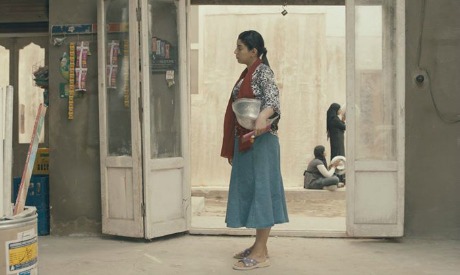
A screenshot from Harag W Marag.
From the very start of Nadine Khan’s Harag W Marag (Chaos, Disorder), viewers are plunged into the banalities of being Egyptian — or even Arab as the director claims — in a semi-urban landscape: obnoxious children plotting trouble; youth with nothing to do; juvenile bullying injected with simmering levels of testosterone and a palpable lack of sexual fulfilment.
In exploring the day-in day-out habits of this pseudo-fantastical community, Khan swings her camera onto the notions of submission and strict governance. Her protagonists are a group of people who have little room for input on their fate and barely any space to stray or be different. And yet everything appears normal.
At the centre of the storyline is Manal (Ayten Amer), a young flirtatious woman looking for someone to be married to, a journey that pushes two potential suitors, Zaki (Mohamed Farag) and Mounir (Ramsi Lehner), to face-off in a football match.
“Most of the characters in this society, including Manal, have little control over their actions. Events happen by chance, no one is in pursuit of anything,” Khan told audiences after Friday’s screening.
“Manal runs after the idea of being married, of walking down the street next to a man.”
The community that Khan reveals receives daily rations from an undisclosed "ruler": trucks loaded with meat, crates of colocasia, gallons of water and gluey oriental sweets snake through the thin streets of this village.
Although there are traces of scuffles over limited quantities, a sense of discontent over the unavailability of basic necessities doesn’t keep residents of this community up at night. In a series of comical and shamelessly clichéd ploys, they are more concerned with gossip and plotting to backstab one another for personal gain — sometimes as small as scoring a cigarette on a misty morning.
Khan cleverly juxtaposes this seemingly silent disintegration of society with a very public central radio. The host takes to the microphone hourly to announce a variety of news: the arrival of food and services caged in trucks, newborns, wedding announcements, song dedications, lost and found items and cheeky cooking tips.
Public radios are commonly utilised across small communities in rural Egypt. Here, Khan plays on a sense of cohesion that grows comical as the story unfolds.
“This society is perhaps a representative sample of something. It’s a closed society with its own set of rules that remain out of the control of its inhabitants,” said Khan, adding that by controlling the economic structure, the external force that seems to navigate this community inevitably wields control over its social structure, a reality that has been cemented for generations and is no longer questioned.
Khan’s set is chiefly built of pink walls and whitewashed frosty air. Quickly the set becomes the natural habitat of her crew.
“We filmed the scenes in their proper sequence. The same people came in to be filmed everyday so slowly they really became the community that lived in that place … they started to have input in what was taking place,” explained Khan.
An actor who plays Toktok, stands next to Amer as the strongest performers. Hassan Khan's surrealistic soundtrack combined with Abdel Salam Moussa's cinematography, which shifts between close-up shots and a wide aerial view of this fantastical community, make for an enjoyable experience, despite some undistinguished performances.
Harag w Marag, which Khan co-wrote, is her directorial debut. The film was originally released in Egypt in 2013. According to Khan, it did not fare well in commercial cinemas because it was released during the weeks that led to removal of the president Mohamed Morsi from power, a time when the streets were filled with uncertainty and high political turbulence.
Screenings at Zawya will continue until Tuesday, 10 February. Check out their website for screening hours and more information on booking.
Short link: